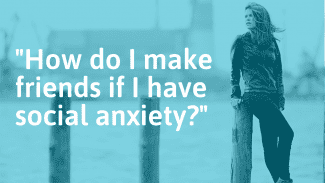“Why do I laugh when things are clearly uncomfortable? Or smile at inappropriate times? It’s embarrassing and annoying. It’s like I can’t stop. It just seems to happen so automatically, and I feel like I can’t help it. What should I do?”
This article will teach you about nervous laughter and its common causes. We will also discuss some strategies you can use to stop smiling or laughing at inappropriate times.
For tips on how to act appropriately in social situations, see our guide on how to improve your social intelligence.
What is nervous laughter?
Nervous laughter happens when you start laughing or smiling during an inappropriate situation. For example, someone might be crying when they tell you about someone who died. Or, they might be talking about how scared they feel about an upcoming project. In these instances, it’s clear that laughter isn’t the right way to connect with someone.
Nervous laughter happens to almost everyone at some point. But if it feels uncontrollable or affecting your relationships, it could be a sign of a deeper issue.
Sections
Causes for nervous laughter
There are many causes for nervous smiling or laughter. Here are some of the most common ones.
Psychological Causes
Most of the time, nervous laughter comes from emotional or psychological reasons.
Feeling anxious
When we feel anxious, our thoughts and actions don’t always match. That’s why we sometimes smile or laugh during inappropriate times. It’s the body’s way of coping with the situation or moving on from the discomfort quickly. Sometimes, it’s also a way to “convince” ourselves that the problem isn’t that bad.
Talking about trauma
Laughter can sometimes be a defense mechanism. When you laugh, it can be a way to distract yourself from feeling uncomfortable. If you haven’t fully processed things that happened to you in the past, it makes sense to want to avoid them.
In these cases, the nervous laughter is usually automatic. You’re feeling awkward, so the laughter diffuses the tension. This phenomenon can also explain why some people tend to crack jokes during very serious situations. They don’t know how to cope with the discomfort, so they resort to humor.
Feeling awkward
You might feel the urge to laugh in awkward situations like when people are silent or when you’re just getting to know someone. As mentioned, laughing is a way to try to diffuse the discomfort. So when you feel awkward, laughter might be a natural instinct.
Other people are nervously laughing
Laughter can be contagious, even if it’s inappropriate. If someone in the group starts laughing at an uncomfortable time, you might join in, even if you don’t want to. This can be a subconscious attempt to try to connect with someone else.
Witnessing someone else’s pain
Why do we laugh when other people trip and fall? Or when they’re obviously struggling with something? It seems cruel, but it’s something many of us naturally do.
Some research suggests that we laugh as a defense mechanism. It’s a subconscious way to reduce our own suffering to someone else’s pain.
In the famous Milgram experiments, participants were instructed to electrically shock strangers up to 450 volts. Even though the strangers weren’t actually being shocked, the participants tended to laugh more at higher voltages.[1]
It’s doubtful these participants laughed because they found the situation funny. Instead, they likely felt extremely uncomfortable, and their laughter was how they expressed it.
Long-time habit
If you always respond to discomfort by smiling or laughing, it starts to become a habit. After a while, you might not even recognize that it’s happening.
At the sign of any tension, this is how your body might react. Over time, however, almost anything can trigger this kind of reaction, which can be problematic.
Medical or psychological causes
In some cases, nervous laughter can be a symptom of an underlying health condition. Usually, this isn’t the only symptom. It’s just one symptom in a cluster of many other ones.
Pseudobulbar affect
Pseudobulbar affect (PBA) consists of episodes of uncontrolled laughing or crying. This condition usually stems from neurological issues like strokes, traumatic brain injuries, Alzheimer’s disease, or Parkison’s disease.
PBA often goes undiagnosed. Sometimes, people mistake it for a mental health issue like depression or anxiety. If you think you might be struggling with this condition, it’s important to consult with your doctor. They will refer you to a neurologist who can screen you. If you do have PBA, prescription medication can help.[2]
Kuru (prion disease)
Kuru is an extremely rare condition that happens when the protein, prion, infects the brain. It’s closely associated with cannibalism, which is why it’s so rare.
Over time, the prion builds up, affecting the brain from doing its job efficiently.[3] This process can damage your mood regulation and emotions, which can cause nervous laughter.
Hyperthyroidism
Hyperthyroidism happens when the body produces too many thyroid hormones. These hormones affect how the body uses energy. They can control everything from your breathing and heart rate to your mood and emotions.[4]
In some cases, nervous laughter can be a symptom of hyperthyroidism. Consult with your doctor about taking a thyroid test. There are therapies and medication that can help with your symptoms.
Graves’ disease
Graves’ disease happens when the body’s immune system produces too many antibodies connected to the thyroid cells. This process can overstimulate the thyroid gland, which causes it to make too many thyroid hormones.[5]
As mentioned, having too many thyroid hormones can result in having nervous laughter.
Autism or Asperger’s Disorder
People with autism or Asperger’s Disorder have trouble reading social cues. They may laugh at inappropriate times without realizing it’s inappropriate. They might also think something is funny, even if other people disagree.
Psychosis
Psychosis can happen when someone sees, feels, or hears something that isn’t there. They might laugh nervously or inappropriately as a result. Psychosis is a symptom associated with conditions like schizophrenia and severe bipolar disorder. It can also result from drug or alcohol abuse.
Overcoming nervous laughter
No matter the root cause, it’s important to learn how to stop smiling or laughing at inappropriate times. Here are some strategies to try.
Focus on the person you talk to
When we focus our attention on someone or something rather than on ourselves, we tend to become less self-conscious and nervous. There are two reasons for this. First, we become more engaged in the conversation or in what’s going on around us. Second, we forget about ourselves for a while.
This can make us less prone to start smiling or laughing when it’s not appropriate.
See our guide on more tips for how to stop feeling nervous talking to people.
Think about the times when you laugh nervously
It’s important to know your patterns if you want to change your habits. Start by thinking about the situations that trigger your nervous laughter. Who are you with? What are you doing? What other thoughts or feelings are you having?
Spend a month tracking each time you laugh nervously. Use a journal or a phone app. Answer these questions:
- What caused my nervous laughter?
- What did I do to try to stop myself?
At this stage, you’re acting like a researcher and collecting data. You’re gaining insight into your patterns. You need this insight if you want to make the right changes.
Prioritize more mindfulness in your life
When you’re mindful, you’re in the present moment. You’re not focused on what happened in the past or what lies ahead in the future. If you can stay present, you’ll be able to pay attention to your emotions more easily. That will make it easier to control them, rather than having them control you.
There are ways to practice mindfulness. Here are some techniques to try:
- Practice doing a chore or task without any other distractions.
- Spend ten minutes a day allowing your mind to wander freely.
- Practice observing and watching people around you while you wait in line.
You can also consider adding more formal meditation into your life. Meditation can help improve your overall well-being. It reduces stress and increases better emotional regulation.
If you want to learn how to meditate, check out this beginner’s guide by Headspace.
Take deep breaths before social interactions
Deep breathing is one of the best and easiest ways to practice mindfulness.
Start by taking a few deep breaths before any social interaction. Hold your hand on your belly to practice this skill. Breathe in deeply through your nose and hold your breath for five counts. Then, exhale for five counts. Practice at least five times.
Get in the habit of breathing like this as often as you can. It helps slow down your mind, which can help you feel less anxious and uncomfortable.
Practice more empathy
Some people are naturally empathic. If you struggle with empathy, you can still work on cultivating this skill. It takes time, practice, and willingness.
Try to imagine yourself in someone else’s shoes when talking. If a friend is telling you a story about failing a test, spend a moment imagining how they must feel.
Empathy starts with active listening. Don’t engage in any distractions when someone else talks. Pay attention to their body language. If you don’t understand this topic very well, see our guide to the best body language books.
Try to avoid making assumptions or judgments. The more you can imagine how someone might feel, the less likely you are to smile or laugh when it’s not appropriate to do so.
Socialize more frequently
If you don’t spend a lot of time with people, you may feel awkward or nervous during social interactions. This discomfort can lead you to respond inappropriately.
Make the effort to get out in the world. Say yes to social invitations. Try a new Meetup. If you’re not sure where to start, see our main guide on the best social hobbies to meet new people and our guide on how to be more social.
Even if things don’t always go well, the more you practice socializing, the easier it becomes. Through socialization, you will learn more about body language and small talk. As you become more aware of how people communicate, it becomes more intuitive.
Practice self-care throughout the day
Self-care is any deliberate act of self-compassion. When you practice it consistently, self-care can help with emotional regulation.
Start small. Think about adding 30 more minutes of self-care to your day. If you’re extremely busy, break these 30 minutes into 10-minute chunks. Try to make self-care a non-negotiable part of your day. The more you prioritize it, the more you will realize its importance.
Here are some simple self-care exercises you can do anywhere:
- Journal about your feelings or your day.
- Take a walk.
- Listen to your favorite music.
- Call or text someone you love.
- Snuggle with a pet.
- Think about your gratitude and write it down.
- Practice a hobby.
- Take a warm bath or shower.
Self-care itself won’t stop the nervous laughter. But if your nervous laughter stems from anxiety or discomfort, self-care is an integral part of managing these emotions. The kinder you are to yourself, the more likely you are to feel confident around others.
Ask a friend to hold you accountable
You can talk about your struggles with a close friend. Let them know that you want to improve your social skills and that you want to stop laughing at inappropriate times.
Ask them if they’re willing to call you out when they notice the laughter. A “call out” can be a codeword or hand on the shoulder.
Try not to get offended when they stick to their commitment. Even if you feel embarrassed, your friend is there to support you.
Come up with a positive mantra
Positive mantras can help ground you when you feel triggered to laugh. The best mantras are short, easy to remember, and believable. Here are some examples you can try:
- I can deal with my emotions effectively.
- I am going to have positive interactions today.
- I am open to having a positive experience today.
- I can respond to all situations appropriately.
Remember that a mantra isn’t meant to “shame” you into behaving a certain way. Instead, it can act as a gentle reminder that you’re capable of change and growth.
Dealing with nervous laughter when you’re already laughing
Sometimes, despite the best mental tricks, you might still start laughing at inappropriate times. Here are some things you can do if this happens.
Think of something absolutely awful
This mental trick can work in some cases. When you feel the giggles coming on, pause and think about something horrific. Everyone’s “horrific visualization” will look different, but chances are, you have something that comes to mind.
The next time you notice yourself laughing (or wanting to laugh), imagine that horrific thing happening. It can help you change your mindset.
Think about boring facts
If the “something awful” visualization doesn’t work, you can try taking the opposite approach. With this strategy, you’re going to focus on neutralizing your emotions. Instead of thinking about your feelings, you’re going to focus on facts.
Start scanning through the facts that you know: your height, name, the date, the color of the walls in the room. Ideally, these should be facts that don’t excite or upset you. Focus on these facts when you start laughing. You might be able to ground yourself back into the present moment.
Distract yourself physically
Laughter can be a discharge of physical energy. Instead, try to focus on different physical sensations. For example, you can try flicking a rubber band on your wrist. You can also literally practice biting your tongue.
Of course, these distractions shouldn’t be an act of punishment. They are more of a distraction. If you struggle with any history of self-harm like cutting or burning, this technique isn’t recommended.
Excuse yourself to go laugh
If you’re stuck in a laughing fit, trying to stop can sometimes make things worse. Instead, quickly leave the room. Get it all out. Even if it feels embarrassing, it’s better than laughing uncontrollably during a serious situation.
Only come back into the room when you feel grounded and ready to pay attention. If anyone asks why you left, you can just say that you wanted to respect the speaker and not interrupt them.
Apologize when you laugh inappropriately
If you end up laughing during an inappropriate time, acknowledge the behavior. It’s much more uncomfortable for everyone if you ignore it. Someone might believe that you’re laughing at them. Other people might think you’re acting insensitive or rude.
Your apology doesn’t need to be over-the-top. You can say, “I know it’s not funny. Sometimes, I laugh when I feel nervous. I apologize.”
Apologizing shows that you respect the other person. It also demonstrates your willingness to be accountable for your actions.
What if you can’t stop the nervous laughter?
In some cases, these self-help strategies might not be enough. Here are some other suggestions worth thinking about.
Talk to your doctor
As mentioned, nervous laughter can be a symptom of a medical condition. It’s a good idea to get a physical every year. Talk to your doctor about what’s going on. They can refer you to the right testing and screenings.
Doctors can also refer you to psychiatrists. Sometimes, medication can help with nervous laughter, particularly if the laughter is due to anxiety.
Try therapy
Therapy can help with social skills and self-esteem. Most of the time, nervous laughter comes from feeling uncomfortable or anxious. It’s important to learn how to deal with these emotions productively.
We recommend BetterHelp for online therapy, since they offer unlimited messaging and a weekly session, and are cheaper than going to a therapist's office.
Their plans start at $64 per week. If you use this link, you get 20% off your first month at BetterHelp + a $50 coupon valid for any SocialSelf course: Click here to learn more about BetterHelp.
(To receive your $50 SocialSelf coupon, sign up with our link. Then, email BetterHelp’s order confirmation to us to receive your personal code. You can use this code for any of our courses.)
A cognitive-behavioral therapist can help you process your feelings and develop healthy coping techniques.








